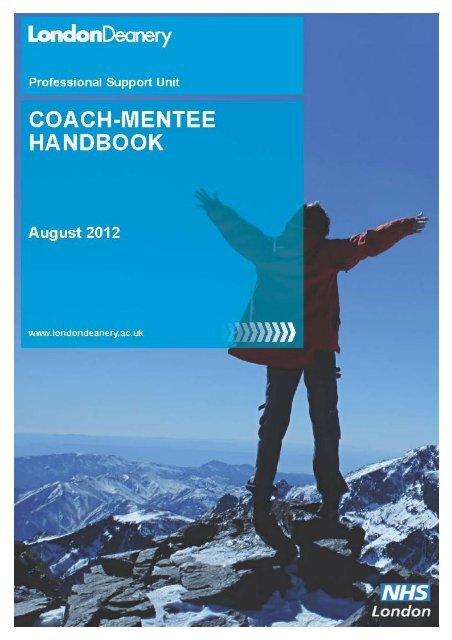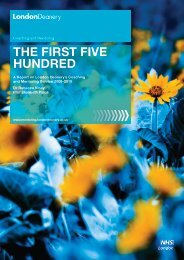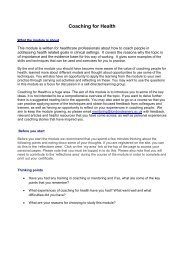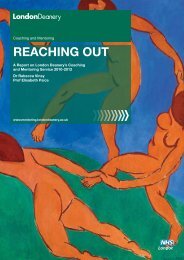Coach-Mentee Handbook - Mentoring - London Deanery
Coach-Mentee Handbook - Mentoring - London Deanery
Coach-Mentee Handbook - Mentoring - London Deanery
You also want an ePaper? Increase the reach of your titles
YUMPU automatically turns print PDFs into web optimized ePapers that Google loves.
Professional Support Unit<br />
COACH-MENTEE<br />
HANDBOOK<br />
August 2012<br />
www.londondeanery.ac.uk
CONTENTS<br />
Introduction for <strong>Coach</strong>-<strong>Mentee</strong>s 3<br />
What skills do the <strong>Mentee</strong> and <strong>Coach</strong>/Mentor need? 3<br />
Benefits of <strong>Coach</strong>ing and <strong>Mentoring</strong> 4<br />
Choosing a <strong>Coach</strong>/Mentor 4<br />
How to join the programme 5<br />
Ground Rules for <strong>Mentee</strong>s 6<br />
<strong>Mentee</strong> Guidelines 7<br />
Ethical Framework for <strong>Coach</strong>es and Mentors 8<br />
1. Competence 8<br />
2. Professionalism 8<br />
3. Integrity 9<br />
<strong>Mentoring</strong> Agreement and Declaration 10<br />
<strong>Coach</strong>ing and <strong>Mentoring</strong> Agreement and Declaration 11<br />
<strong>London</strong> <strong>Deanery</strong> Professional Support Unit
INTRODUCTION FOR COACH-MENTEES<br />
(Please make sure that you have read the overview first)<br />
People do grow, learn, thrive and excel when organisations make provisions for<br />
particular and specific interpersonal support at key times (Cross 1998).<br />
You may find coaching and mentoring particularly helpful if you are at a crossroads in<br />
your career or have suffered a setback in your ambitions and are having to consider<br />
new options for the future. Or you may simply want to explore ways of further fulfilling<br />
your potential.<br />
The programme enables you to talk to your <strong>Coach</strong>/Mentor in complete confidence about<br />
professional or career issues. Your <strong>Coach</strong> or Mentor will be an experienced and trained<br />
individual.<br />
You can take up to four sessions over six months to spend on your personal<br />
development.<br />
This is a mentoring service which applies coaching skills and techniques, so we use the<br />
terms coaching and mentoring interchangeably.<br />
So what does a <strong>Coach</strong>/Mentor do?<br />
“<strong>Coach</strong>ing and <strong>Mentoring</strong> are learning relationships which help people to take charge of<br />
their own development, to release their potential and to achieve results which they<br />
value.” Connor and Pokora, 2007<br />
“Mentors are people who, through their action and work, help others to achieve their<br />
potential” Shea 1992<br />
What makes coaching and mentoring work?<br />
The success of coaching and mentoring is in the establishment of an effective<br />
relationship, based upon mutual respect, honesty and understanding.<br />
A <strong>Coach</strong> or a Mentor doesn’t necessarily have to be someone senior to you in the<br />
organisation, but rather needs to have the motivation and training to support you (the<br />
<strong>Mentee</strong>) in your development.<br />
It goes without saying that other qualities such as a varied career and life experience, a<br />
wide professional network and commitment to their own development will enrich the<br />
mentoring relationship.<br />
The <strong>Coach</strong>/Mentor would need to have “something” (quality / skill / experience) that you<br />
see as being helpful to you in your personal or professional life.<br />
Not advice but help<br />
A <strong>Coach</strong>/Mentor does not give advice, but rather helps the <strong>Mentee</strong> to weigh up<br />
situations using a process of reflection, questions, challenge and feedback allowing the<br />
<strong>Mentee</strong> to come to a decision themselves. It is crucial to remember that in any<br />
mentoring relationship it is the <strong>Mentee</strong> who drives the agenda, not the <strong>Coach</strong> or the<br />
Mentor.<br />
What skills do the <strong>Mentee</strong> and <strong>Coach</strong>/Mentor need?<br />
Table 1: Basic competencies for <strong>Coach</strong>es/Mentors and <strong>Mentee</strong>s<br />
• Communication skills to articulate problems and ideas<br />
<strong>London</strong> <strong>Deanery</strong> Professional Support Unit <strong>Coach</strong>-<strong>Mentee</strong> <strong>Handbook</strong> 3
• To listen and to challenge constructively<br />
• The ability to be honest with oneself and the other partner and to reflect upon what is<br />
being said, both at the time and subsequently<br />
• Capacity for empathy<br />
Taken from Megginson et al <strong>Mentoring</strong> in Action - a practical guide 2006 Kogan Page<br />
Table 2: 10 core competencies of <strong>Coach</strong>es and Mentors<br />
• Knows what I am talking about<br />
• Not intimidating, easy to approach at any time<br />
• Interested in me (the <strong>Mentee</strong>) personally, genuine concern<br />
• Provides subtle guidance, but ensures I make decisions<br />
• Actually questions me<br />
• Willing to debate / challenge me<br />
• Will give honest answers<br />
• Does not blame, stays neutral<br />
• Is enabling, caring, open and facilitative<br />
• Gives constructive and positive feedback<br />
Adapted from The effective mentoring section of the Edgehill University core reference<br />
material original data from Brigden 2000<br />
Benefits of <strong>Coach</strong>ing and <strong>Mentoring</strong><br />
In a study by researchers Garvey and Garrett-Harris in 2005, it was found that the<br />
benefits of coaching and mentoring to <strong>Mentee</strong>s were:<br />
1. Improved performance and productivity<br />
2. Career opportunity and advancement<br />
3. Improved knowledge and skills<br />
4. Greater confidence and well being<br />
Choosing a <strong>Coach</strong>/Mentor<br />
In the <strong>London</strong> <strong>Deanery</strong> we recognise that coaching and mentoring works best when<br />
<strong>Mentee</strong>s are provided with enough information to choose a <strong>Coach</strong>/Mentor themselves.<br />
We therefore use the detailed information provided in your application to shortlist three<br />
<strong>Coach</strong>es and Mentors who we think might best fit your needs.<br />
When your application is being processed you will receive a telephone call from a<br />
<strong>Deanery</strong> Matcher to ascertain your needs, this enables the <strong>Coach</strong>ing and <strong>Mentoring</strong><br />
service to offer you the most suitable <strong>Coach</strong>es/Mentors. All Matchers are doctors who<br />
are trained <strong>Coach</strong>es/Mentors and anything you say to them is completely confidential.<br />
Following this conversation we will use the information that you have given us and the<br />
detailed information that we have on our accredited <strong>Coach</strong>es/Mentors to select three<br />
<strong>Coach</strong>es and Mentors for you. You will then be given ‘pen portraits’ of three<br />
<strong>Coach</strong>es/Mentors and you choose the one who you judge to be your best fit.<br />
<strong>London</strong> <strong>Deanery</strong> Professional Support Unit <strong>Coach</strong>-<strong>Mentee</strong> <strong>Handbook</strong> 4
You will arrange an initial trial meeting to meet one of them, to set your agenda and<br />
reach an agreement on how you will proceed. If the first meeting does not work for you,<br />
you can without giving a reason, choose another.<br />
How to join the programme<br />
You’ve already shown an interest by reading this document. On the homepage of our<br />
website you will see an online application form.<br />
If you are in a training post it is generally a good idea to get the support and approval of<br />
your Clinical or Educational Supervisor so that you can get time off for being mentored.<br />
They should certainly be keen to agree because of their commitment to continuous<br />
learning.<br />
If you are in a non-training post please note that most <strong>Coach</strong>es/Mentors offer sessions<br />
in the evenings and at weekends.<br />
Please give a considered response to the space for outlining your reasons for wanting<br />
to take part since we will use it to select you a choice of 3 <strong>Coach</strong>es/Mentors in the<br />
matching process. If you have further queries you may email the team on<br />
mentoring@londondeanery.ac.uk<br />
Kind regards<br />
Dr Rebecca Viney,<br />
<strong>Coach</strong>ing and <strong>Mentoring</strong> Lead<br />
Associate Dean<br />
Professional Development Department<br />
<strong>London</strong> <strong>Deanery</strong><br />
Stewart House<br />
32 Russell Square<br />
<strong>London</strong><br />
WC1B 5DN<br />
0207 866 3242<br />
<strong>London</strong> <strong>Deanery</strong> Professional Support Unit <strong>Coach</strong>-<strong>Mentee</strong> <strong>Handbook</strong> 5
GROUND RULES FOR MENTEES<br />
1. Each mentoring session should last 60-90 minutes, and takes place about four<br />
times a year, over a period of up to six months.<br />
2. The meeting place is a mutually convenient one. It is often helpful to meet<br />
somewhere away from the hassles of the workplace. As mentoring sessions are<br />
considered a professional activity, social venues are avoided.<br />
3. All <strong>Mentee</strong>s will sign a <strong>Mentee</strong> agreement.<br />
4. All <strong>Coach</strong>es/Mentors will work by an ethical code of practice (see Section 4).<br />
<strong>Mentee</strong>s are also expected to adhere to the principles laid out in this code and<br />
should read this section carefully.<br />
<strong>London</strong> <strong>Deanery</strong> Professional Support Unit <strong>Coach</strong>-<strong>Mentee</strong> <strong>Handbook</strong> 6
MENTEE GUIDELINES<br />
1. At the end of each meeting, the Mentor and <strong>Mentee</strong> may wish to fill in a reflective<br />
practice sheet.<br />
2. At the conclusion of each meeting, the <strong>Mentee</strong> and Mentor will review their<br />
position and decide whether to arrange further meetings.<br />
3. After each session the <strong>Mentee</strong> should take note of any action points and check<br />
these have been completed before the next session.<br />
4. At the end of the mentoring sessions the <strong>Mentee</strong> will be required to complete an<br />
Exit Evaluation questionnaire online giving feedback on their mentoring<br />
experience.<br />
5. All information supplied to the mentoring administrator is confidential and will be<br />
available only to the <strong>Mentoring</strong> Team. Mentors are accountable in terms of their<br />
standards, ongoing education, development and commitment as a Mentor to the<br />
<strong>Deanery</strong>.<br />
6. <strong>Mentee</strong>s should be prepared to travel a reasonable distance, if necessary, to meet<br />
their Mentor.<br />
7. Participating in the mentoring scheme as a <strong>Mentee</strong> implies a commitment to the<br />
process.<br />
8. Once allocated a Mentor, <strong>Mentee</strong>s will be asked to reaffirm their declaration of<br />
any professional criminal proceedings.<br />
9. The <strong>Mentee</strong> should be aware of their rights and any complaints procedures.<br />
<strong>London</strong> <strong>Deanery</strong> Professional Support Unit <strong>Coach</strong>-<strong>Mentee</strong> <strong>Handbook</strong> 7
ETHICAL FRAMEWORK FOR COACHES AND MENTORS<br />
While the coaching agenda is the client’s, the <strong>Coach</strong>/Mentor must keep in mind at all<br />
times the healthcare context in which the client is working and the implications for patent<br />
care of the changes the client wishes to make.<br />
The time of doctors is a scarce resource. To justify the investment of time, coaching and<br />
mentoring must add value in terms of enhancing the motivation, performance or<br />
retention of doctors.<br />
1. Competence<br />
1.1 <strong>Coach</strong>/Mentors should continuously develop their skills through reflection,<br />
training and supervision.<br />
1.2 <strong>Coach</strong>/Mentors should recognise the limits of their competence and work within<br />
them, suggesting alternative sources of support where these would be more<br />
appropriate.<br />
1.3 <strong>Coach</strong>/Mentors should maintain a relationship with a suitably qualified<br />
supervisor.<br />
1.4 <strong>Coach</strong>/Mentors must listen to clients and help them make the changes they want<br />
to make in order to improve their service to patients and the public or achieve a<br />
healthier balance in their lives.<br />
1.5 <strong>Coach</strong>/Mentors should work with colleagues in the ways that best serve the<br />
interests of clients and patients.<br />
2. Professionalism<br />
2.1 <strong>Coach</strong>/Mentors should treat clients as whole people with lives outside medicine;<br />
treat all clients with respect for their individuality and their diversity of cultures,<br />
beliefs, sexuality and lifestyles.<br />
2.2 <strong>Coach</strong>es/Mentors should challenge their clients if it becomes apparent that the<br />
client is not treating their patients as individuals, respecting their dignity, being<br />
polite and considerate towards them and respecting their confidentiality.<br />
2.3 <strong>Coach</strong>/Mentors must respect clients’ right to confidentiality, within the constraints<br />
set by the law and by the duties of a doctor.<br />
2.4 <strong>Coach</strong>/Mentors should be responsive to the client in the language they use and<br />
the way they manage the relationship and the process. Ensure that the<br />
expectations of the client are clear and understood.<br />
2.5 <strong>Coach</strong>/Mentors should respect the resourcefulness of the client and their ability<br />
to find their own solutions.<br />
2.6 <strong>Coach</strong>/Mentors should not encourage dependency and should work to bring the<br />
relationship to a conclusion by mutual consent.<br />
2.7 <strong>Coach</strong>/Mentors must treat all clients equally and not discriminate unfairly against<br />
any groups.<br />
2.8 <strong>Coach</strong>es/Mentors must never exploit or abuse the client’s trust or vulnerability.<br />
2.9 Understand that professional responsibilities continue beyond the end of the<br />
coaching/mentoring relationship.<br />
<strong>London</strong> <strong>Deanery</strong> Professional Support Unit <strong>Coach</strong>-<strong>Mentee</strong> <strong>Handbook</strong> 8
3. Integrity<br />
3.1 <strong>Coach</strong>/Mentors must be honest and open and act with integrity.<br />
3.2 <strong>Coach</strong>/Mentors must act without delay if they have good reason to believe that<br />
their client may be putting patients at risk.<br />
<strong>London</strong> <strong>Deanery</strong> Professional Support Unit <strong>Coach</strong>-<strong>Mentee</strong> <strong>Handbook</strong> 9
COACHING AND MENTORING AGREEMENT AND<br />
DECLARATION<br />
The <strong>Coach</strong>ing and <strong>Mentoring</strong> Agreement Declaration consists of two sections and<br />
should be completed at the beginning of the first session. The first section establishes a<br />
signed agreement between the Mentor and the mentee to meet for a declared maximum<br />
number of sessions. The <strong>London</strong> <strong>Deanery</strong> standard is for four mentoring sessions, but<br />
in some cases it may be agreed to undertake more. Undertaking more than four<br />
sessions requires prior agreement from Dr Viney, the <strong>London</strong> <strong>Deanery</strong> <strong>Coach</strong>ing and<br />
<strong>Mentoring</strong> Lead.<br />
The second section confirms the mentee’s acceptance of the <strong>London</strong> <strong>Deanery</strong><br />
<strong>Coach</strong>ing and <strong>Mentoring</strong> regulations, and checks whether there are any legal<br />
circumstances that could prohibit the mentee undertaking mentoring. A copy of the<br />
mentee ground rules, guidelines and ethical code of practice is attached. This section<br />
must be signed by the mentee. It should be noted that either party may dissolve the<br />
relationship.<br />
By both parties respecting the Ethical Code and <strong>Coach</strong>es/Mentors practising to<br />
the <strong>Coach</strong>ing and <strong>Mentoring</strong> Standards means that it is expected that:<br />
1. The Mentor will respond to the mentee’s needs and agenda; it is not to impose<br />
their own agenda.<br />
2. Computer-based records are kept in accordance with statutory regulation under<br />
the data protection act 1984.<br />
3. Mentors and <strong>Mentee</strong>s should respect each other’s time and other responsibilities,<br />
ensuring they do not impose beyond what is reasonable.<br />
4. The <strong>Mentee</strong> must accept increasing responsibility for managing the relationship;<br />
the Mentor should empower them to do so and must generally promote the<br />
learner’s autonomy.<br />
5. Mentors need to be aware of the limits of their own competence in the practice of<br />
mentoring.<br />
6. The Mentor will not intrude into areas the <strong>Mentee</strong> wishes to keep private until<br />
invited to do so. However they should help the <strong>Mentee</strong> to recognise how other<br />
issues may relate to these areas.<br />
7. Mentors and <strong>Mentee</strong>s should aim to be open and truthful with each other and<br />
themselves about the relationship itself.<br />
8. Mentors and <strong>Mentee</strong>s share the responsibility for the smooth winding down of the<br />
relationship when it has achieved its purpose – they must avoid creating<br />
dependency.<br />
9. The mentoring relationship must not be exploitative in any way; neither may it be<br />
open to misinterpretation.<br />
<strong>London</strong> <strong>Deanery</strong> Professional Support Unit <strong>Coach</strong>-<strong>Mentee</strong> <strong>Handbook</strong> 10
COACHING AND MENTORING AGREEMENT AND<br />
DECLARATION<br />
Private and Confidential<br />
Agreement<br />
This is to agree a course of coaching/mentoring sessions, to take place over the period of up to one<br />
year, on dates to be arranged between the mentor and mentee.<br />
<strong>Mentee</strong> Name: ………………………………………………………………………………………..<br />
Mentor Name: ………………………………………………………………………………………..<br />
Maximum number of sessions*: …………………………<br />
* Authorisation must be obtained from <strong>London</strong> <strong>Deanery</strong> <strong>Coach</strong>ing and <strong>Mentoring</strong> before committing<br />
to, or undertaking more than 4 mentoring sessions.<br />
<strong>Mentee</strong> Signed: ……………………………………… Date: ……………………………..<br />
Mentor Signed: ………………………………………. Date: ……………………………..<br />
<strong>Mentee</strong> Declaration<br />
Please delete as applicable:<br />
1. I have / have not read the Overview of <strong>Coach</strong>ing and <strong>Mentoring</strong> (on the <strong>London</strong> <strong>Deanery</strong><br />
website) and the <strong>Mentee</strong> <strong>Handbook</strong>, FAQ’s and agree to the following:<br />
· The ground rules for mentee<br />
· The mentee agreement<br />
· The ethical code of practice<br />
2. I confirm that I am / I am not currently the subject of any investigation or fitness to practice<br />
proceeding by any employer, any licensing or regulatory body in the United Kingdom or any<br />
other country. If my circumstances change during my mentoring I will inform the <strong>London</strong><br />
<strong>Deanery</strong> <strong>Mentoring</strong> Team.<br />
The <strong>London</strong> <strong>Deanery</strong> <strong>Coach</strong>ing and <strong>Mentoring</strong> service reserves the right to review membership of any<br />
mentee whose conduct is in conflict with the above terms or is at any time or in any way inappropriate.<br />
<strong>Mentee</strong> Signed: ……………………………………….. Date: …………………………….<br />
Please return by post to:<br />
<strong>Coach</strong>ing and <strong>Mentoring</strong> Administrator - Faculty Development<br />
Unit, <strong>London</strong> <strong>Deanery</strong>, Stewart House, 32 Russell Square, <strong>London</strong><br />
WC1B 5DN<br />
<strong>London</strong> <strong>Deanery</strong> Professional Support Unit <strong>Coach</strong>-<strong>Mentee</strong> <strong>Handbook</strong> 11






